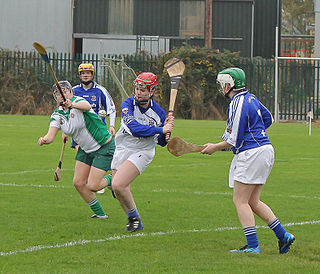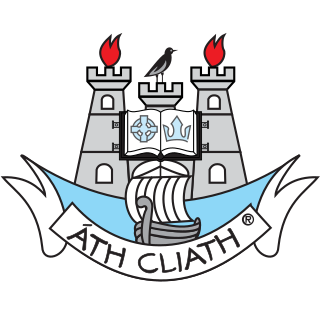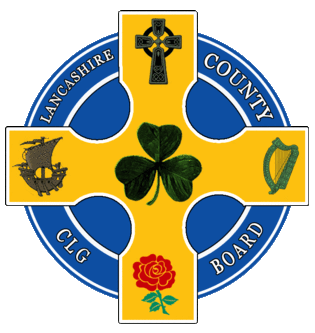Related Research Articles

Camogie is an Irish stick-and-ball team sport played by women. Camogie is played by 100,000 women in Ireland and worldwide, largely among Irish communities.

Kilmacud Crokes is a large Gaelic Athletic Association club located in Stillorgan, Dublin, Republic of Ireland.

The Dublin County Board of the Gaelic Athletic Association (GAA) or Dublin GAA is one of the 32 county boards of the GAA in Ireland, and is responsible for Gaelic games in the Dublin Region and the Dublin county teams. The teams and their fans are known as "The Dubs" or "Boys in Blue". The fans have a special affiliation with the Hill 16 end of Croke Park.

The Carlow County Board of the Gaelic Athletic Association (GAA) or Carlow GAA is one of the 32 county boards of the GAA in Ireland, and is responsible for Gaelic games in County Carlow and the Carlow county teams.

The Louth County Board of the Gaelic Athletic Association (GAA) or Louth GAA is one of the 32 county boards of the GAA in Ireland, and is responsible for Gaelic games in County Louth. The county board is also responsible for the Louth county teams.
De La Salle College Waterford is a secondary school in Waterford, Ireland with over 1,000 students and 90 teachers.
The history of the Gaelic Athletic Association is much shorter than the history of Gaelic games themselves. Hurling and caid were recorded in early Irish history and they pre-date recorded history. The Gaelic Athletic Association itself was founded in 1884.
The All-Ireland Post-Primary Schools Croke Cup, is an annual inter-schools hurling competition organised by the Gaelic Athletic Association. It is the highest inter-schools hurling competition in Ireland, and has been contested every year, except on two occasions, since 1944.

The Lancashire County Board of the Gaelic Athletic Association (GAA), or Lancashire GAA, is one of the county boards outside Ireland and is responsible for the running of Gaelic games in the North West of England and on the Isle of Man. With Scotland, Warwickshire, Gloucestershire, Hertfordshire, London and Yorkshire, the board makes up the British Provincial Board. The Lancashire board oversees the Lancashire Junior Championship, the Lancashire Junior League, and the first and second division of the Pennine League.
The following is an alphabetical list of terms and jargon used in relation to Gaelic games. See also list of Irish county nicknames, and these are very interesting.
The All-Ireland Colleges Camogie Championships are a range of Irish camogie tournaments played each year to determine the national champion secondary school or second level college at senior and junior level over a range of grades.
The All-Ireland Junior Camogie Championship is a competition for third-tier county teams in the women's field sport of camogie and for second-string teams of first-tier counties. In accordance with the practice in GAA competitions the term junior applies to the level of competition rather than the age group.
Navan O'Mahony's is a Gaelic Athletic Association club located in the town of Navan in County Meath, Ireland. The club competes in Meath competitions. With 20 Senior Football wins they are the most successful football club in Meath. The club has also won 2 Senior Hurling Championships placing them in the top 15 most successful hurling sides in the county.
The 1950 All-Ireland Senior Camogie Championship Final was the nineteenth All-Ireland Final and the deciding match of the 1950 All-Ireland Senior Camogie Championship, an inter-county camogie tournament for the top teams in Ireland.
The 1999 All-Ireland Senior Camogie Championship—known as the Bórd na Gaeilge All-Ireland Senior Camogie Championship for sponsorship reasons—was the high point of the 1999 season and the first final to be played with 15 players a side. The championship was won by Tipperary who defeated Kilkenny by a single point margin in the final. It was Tipeprary's first success after seven previous final losses. The attendance, a then record of 15,084, included President Mary McAleese and Taoiseach Bertie Ahern
The 1969 All-Ireland Senior Camogie Championship was the high point of the 1969 season in Camogie. The championship was won by Wexford who defeated Antrim by a two-point margin in the final.
The 1972 All-Ireland Senior Club Camogie Championship for the leading clubs in the women's team field sport of camogie was won for the second year in succession by Austin Stacks (Du), who defeated Portglenone (Ant) in the final, played at Croke Park.

Derek McGrath is an Irish retired hurler who played as a centre-forward for the Waterford senior team. He is a former manager of the Waterford senior team.
Séamus Gardiner, was the 14th president of the Gaelic Athletic Association (1943–1946).

The Tailteann Games or Aonach Tailteann was an Irish sporting and cultural festival held in the Irish Free State in 1924, 1928, and 1932. It was intended as a modern revival of the Tailteann Games held from legendary times until the Norman invasion of Ireland; as such it drew inspiration from the Modern Olympics revival of the Ancient Olympics. Croke Park, the Dublin headquarters of the Gaelic Athletic Association, was the venue for the opening ceremony and many of the sports events, which were open to people of Irish birth or ancestry. The Tailteann Games were held shortly after the Summer Olympics, such that athletes participating in Paris 1924 and Amsterdam 1928 came to compete. Participants coming from England, Scotland, Wales, Canada, the USA, South Africa and Australia as well as Ireland. Chess competitions were held in conjunction with the Irish Chess Union as part of the Tailteann Games. There were also artistic competitions and industrial displays. The games became regarded as a Cumann na nGaedheal project, and when that party lost power to Fianna Fáil after the 1932 election there was no financial backing for further games.
References
- ↑ "De La Salle crowned All Ireland 7s Camogie Champions" . Retrieved 3 July 2020.